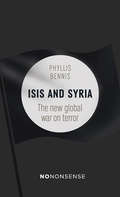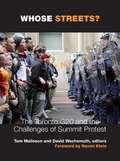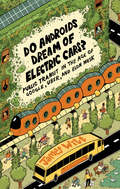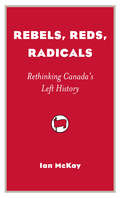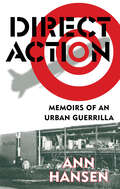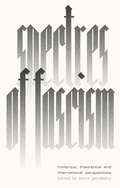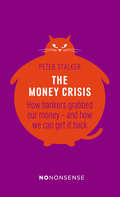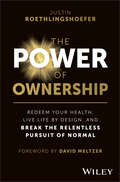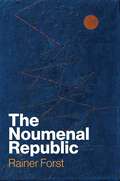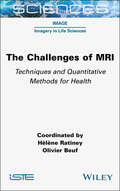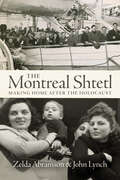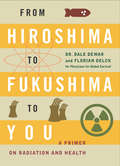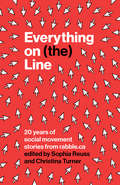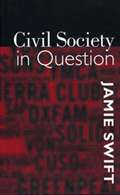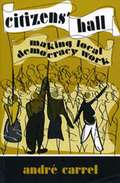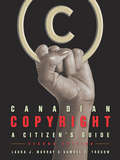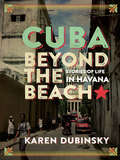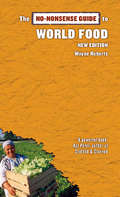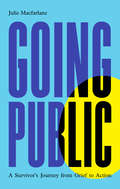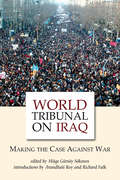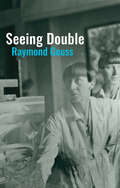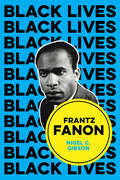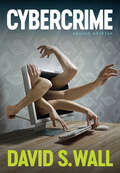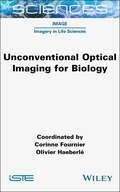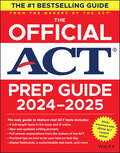- Table View
- List View
NoNonsense ISIS and Syria: The new global war on terror (No-Nonsense Guides #1)
by Phyllis BennisFrom its sudden emergence as a military force to be reckoned with in Syria and Iraq in June 2014 through its YouTube executions of hostages to its atrocious attacks in Paris in November 2015, the movement variously known as ISIS, Islamic State, and Daesh has captured the world’s horrified attention. Where did it come from and how on earth should we respond? This NoNonsense book places ISIS in the broader context of the US-led ‘war on terror’ from the Bush-Blair invasion of Iraq to Obama’s drone attacks. Bennis makes a strong case for responses that build peace and justice rather than feeding the cycle of violence and terror.
Whose Streets?: The Toronto G20 and the Challenges of Summit Protest
by Tom Malleson and David WachsmuthIn June 2010 activists opposing the G20 meeting held in Toronto were greeted with brutal and arbitrary state violence. Whose Streets? is a combination of testimonials from the front lines and analyses of the broader context, an account that both reflects critically on what occurred in Toronto and looks ahead to further building our capacity for resistance. Featuring reflections from activists who helped organize the mobilizations, demonstrators and passersby who were arbitrarily arrested and detained, and scholars committed to the theory and practice of confronting neoliberal capitalism, the collection balances critical perspective with on-the-street intensity. It offers vital insight for activists on how local organizing and global activism can come together.
Do Androids Dream of Electric Cars?: Public Transit in the Age of Google, Uber, and Elon Musk
by James WiltPublic transportation is in crisis. Through an assessment of the history of automobility in North America, the “three revolutions” in automotive transportation, as well as the current work of committed people advocating for a different way forward, James Wilt imagines what public transit should look like in order to be green and equitable. Wilt considers environment and climate change, economic and racial inequality, urban density, accessibility and safety, work and labour unions, privacy and control of personal data, as well as the importance of public and democratic decision-making. Based on interviews with more than forty experts, including community activists, academics, transit planners, authors, and journalists, Do Androids Dream of Electric Cars? explores our ability to exert power over how cities are built and for whom.
Rebels, Reds, Radicals: Rethinking Canada’s Left History (Provocations Ser.)
by Ian McKayIn this brilliant and thoroughly engaging work Ian McKay sets out to revamp the history of Canadian socialism. Drawing on models of left politics in Marx and Gramsci, he outlines a fresh agenda for exploration of the Canadian left. In rejecting the usual paths of sectarian or sentimental histories, McKay draws on contemporary cultural theory to argue for an inventive strategy of “reconnaissance.” This important, groundbreaking work combines the highest standards of scholarship, and a broad knowledge of current debates in the field. Rebels, Reds, Radicals is the introduction to McKay’s definitive multi-volume work on the history of Canadian socialism (volume one, Reasoning Otherwise: Leftists and the People’s Enlightenment in Canada, 1890-1920 is now available).
Direct Action: Memoirs of an Urban Guerrilla
by Ann HansenAnn Hansen stood trial as one of the so-called “Squamish Five.” Sentenced to life in prison, she served seven years. Now she tells her story for the first time. Direct Action captures the excitement and indignation of the counterculture of the early ’80s. Missile tests were fuelling a new arms race. Reckless megaprojects threatened the global environment. Alienation, punk rock, and militancy were on the rise. Hansen and her fellow urban guerrillas believed that sabotaging government and corporate property could help turn things around. To prove their point, they bombed the Litton Systems plant in Toronto, where components for Cruise Missiles were being made. Hansen’s book poses unresolved ethical dilemmas. In light of the recent explosion of anti-globalization protests, Direct Action mirrors the resurgence of militant activity around the world.
Spectres of Fascism: Historical, Theoretical, and International Perspectives
by Samir GandeshaConcerns over the rise of fascism have been preoccupied with the Trump presidency and the Brexit vote in the UK, yet, globally, we are witnessing a turn towards anti-democratic and illiberal forces. From the tragic denouement of the Egyptian Revolution to the consolidation of the so-called Gujarat Model in India under the leadership of Prime Minister Narendra Modi and the consolidation of the power of Turkish President Recep Tayyip Erdogan, to the recent election of Jair Bolsonaro in Brazil, fascist ideology, aesthetics, and personalities appear across the globe. Spectres of Fascism makes a significant contribution to the unfolding discussion on whether what we are witnessing today is best understood as a return to classic twentieth-century fascism or some species of what has been called “post-fascism.” Applying a uniquely global perspective, it combines analyses of historical contexts, theoretical approaches, and contemporary geopolitics.
The Money Crisis: How Bankers Grabbed Our Money—and How We Can Get It Back (No-Nonsense Guides)
by Peter StalkerBankers and speculators build castles in the air but when they come crashing down ordinary people have to pick up the tab. How have we made such a mess of our money system?
The Power of Ownership: Redeem Your Health, Live Life by Design, and Break the Relentless Pursuit of Normal
by Justin RoethlingshoeferLearn to look and feel your best as you discover a new perspective on your mind, body, and health In The Power of Ownership: Redeem Your Health, Live Life by Design, and Break the Relentless Pursuit of Normal, author Justin Roethlingshoefer delivers a transformative tool for empowerment designed to enable you to take control of your health in a holistic and personalized way. After managing the health, wellness and performance of the best athletes in the world for more than a decade, the failure to do that for himself almost cost him his life, and fueled his mission to solve this problem for not just athletes but high achieving people pursuing a mission. Avoiding robotic and cookie-cutter approaches, Roethlingshoefer offers the tools, systems, and processes you need to rebuild your life and health in a way that makes sense for you and your body. The book is a simple, actionable, and relatable tool—instead of a textbook or loose collection of stories—located at the intersection of art and cutting-edge health science. It’s filled with lessons you’ll be able to understand with ease and apply to your life immediately. You’ll find: Strategies you can use to ensure your new health journey is a sustained and effective one that helps you manage stress and avoid burnout Discussions exploding the “Myth of Normal” that breeds shame, fear, guilt, and confusion by normalizing stress and fatigue Explorations of the power and value of a life by design and ways to help you live differently according to what your body requires An essential and inspiring resource for anyone who wants to look and feel better, The Power of Ownership will transform the way you think about and achieve health for your and your team.
The Noumenal Republic: Critical Constructivism After Kant
by Rainer ForstAll human beings are born with equal dignity and possess equal rights. This statement appears normatively just as irrefutable as it is empirically refuted every day. But what are the grounds of this principle, and how should we think about its realization? Its philosophical truth can best be explained by going back to (and beyond) Kant’s notion of a ‘noumenal republic’ in which every person is an equal co-author of the laws that bind all. At the same time, a critical analysis of society and politics must show the extent to which the reality of power and ideology makes a mockery of this constructivist conception of dignity. To bridge the gap between unworldly idealism and practical hopelessness, we need a critical theory after Kant. Rainer Forst, one of the world’s most influential political philosophers, works to develop just such a theory in this powerful and illuminating volume. It contains no less than a new systematic account of concepts such as alienation, progress and regression, solidarity, human rights, justice, power and non-domination.
The Challenges of MRI: Techniques and Quantitative Methods for Health
by Hélène Ratiney Olivier BeufAfter a review of the essential concepts of magnetic resonance imaging (MRI), The Challenges of MRI presents the recent techniques and methods of MRI and resulting medical applications. These techniques provide access to information that goes well beyond anatomy, with functional, hemodynamic, structural, biomechanical and biochemical information. MRI allows us to probe living organisms in a multitude of ways, guaranteeing the potential for continuous development involving several disciplines: physics, electronics, life sciences, signal processing and medicine. This collective work is made up of chapters written and designed by experts from the French community. They have endeavored to describe the techniques by recalling the underlying physics and detailing the modeling, methods and strategies for acquiring or extracting information. This book is aimed at master’s students and PhD students, as well as lecturers and researchers in medical imaging and radiology.
The Montreal Shtetl: Making Home After the Holocaust
by Zelda Abramson John LynchAs the Holocaust is memorialized worldwide through education programs and commemoration days, the common perception is that after survivors arrived and settled in their new homes they continued on a successful journey from rags to riches. While this story is comforting, a closer look at the experience of Holocaust survivors in North America shows it to be untrue. The arrival of tens of thousands of Jewish refugees was palpable in the streets of Montreal and their impact on the existing Jewish community is well-recognized. But what do we really know about how survivors’ experienced their new community? Drawing on more than 60 interviews with survivors, hundreds of case files from Jewish Immigrant Aid Services, and other archival documents, The Montreal Shtetl presents a portrait of the daily struggles of Holocaust survivors who settled in Montreal, where they encountered difficulties with work, language, culture, health care, and a Jewish community that was not always welcoming to survivors. By reflecting on how institutional supports, gender, and community relationships shaped the survivors’ settlement experiences, Abramson and Lynch show the relevance of these stories to current state policies on refugee immigration.
From Hiroshima to Fukushima to You: A Primer on Radiation and Health
by Dale Dewar Florian OelckThe bombing of Hiroshima on August 6, 1945, brought radiation to international attention but the exact nature of what had been unleashed was still unclear to most. The 1986 meltdown at the Chernobyl nuclear plant again made headlines with estimates of fatalities ranging from 4000 to almost a million deaths. By the time of the shocking 2011 disaster at the Fukushima nuclear plant social media meant governments and corporations no longer had a monopoly over the release of information, but transparency remains low on the agenda. Meanwhile, few physicians give thought to the delayed health effects of radiation. It has been the bold physician who has challenged the potential overuse of chest X-rays, CT scanning, or PET scans. This book provides clear and accurate information about radiation so that we can all make informed choices. In clear language it offers answers to citizens’ questions: What is radiation? Where do we encounter it? What are the benefits and risks? How do we develop a responsible future around the uses and abuses of radioactivity?
Everything on (the) Line: 20 Years of Social Movement Stories from rabble.ca
by Sophia Reuss Christina TurnerOn a chilly April day in 2001, some 75,000 protesters flooded the streets of Quebec City to denounce corporate globalization and a neoliberal trade deal. From that wellspring of activist anger, energy, and hope came the founding of rabble.ca: an alternative news source and community space that reported on Canadian politics from the ground, catching the attention of journalists and activists across the country. Since then, Canada has seen the rise of Harper Conservatism and its replacement by a Liberal government; a decline in union power; the stalled beginnings of reconciliation with Indigenous nations; the birth of Black Lives Matter; an invigorated climate justice movement; and more. These stories of activist struggle lie at the heart of Everything on (the) Line, a collection of rabble’s most incisive articles from the past twenty years. Editors S. Reuss and Christina Turner guide readers deftly through rabble’s deep and storied archives, combining critical analysis with new essays from celebrated activists and writers such as Russell Diabo, Nora Loreto, Phillip Dwight Morgan, and Monia Mazigh. Each vital selection marks a flashpoint in Canadian politics—and an opportunity to reflect on the social movements that have challenged capitalism, racism, settler colonialism, and patriarchy over the past two decades.
Civil Society in Question
by Jamie SwiftIn this concise, critical study of civil society, Jamie Swift sketches the history of the concept from its roots in the eighteenth century, to the present. Swift looks at its practical application in specific cases, such as Canada’s Victorian Order of Nurses, and with community-based groups in South Asia (India, Nepal, Pakistan, Sri Lanka, and Bangladesh). He examines the relationship between voluntarism, the state, politics, and the market, and considers the motives and priorities of those using the term today.
Citizens’ Hall: Making Local Democracy Work
by Andre CarrelBased on years of practical experience in small towns, Carrel argues for municipal autonomy–for turning what are now “colonies” of the federal and provincial orders of government into independent, mature, and fully democratic entities. For Carrel, the citizen is the sole legitimate source of political power, and the best tool for citizen empowerment is the controversial tool of the referendum.This is the story of how a small municipality broke the rules of local government. It also recounts the author’s irreverence for the status quo and his ideas on the rebuilding of citizenship at the community level.
Canadian Copyright: A Citizen’s Guide
by Laura J. Murray Samuel E. TrosowIn the age of easily downloadable culture, messages about copyright are ubiquitous. If you’re an artist, consumer, or teacher, copyright is likely a part of your everyday life. Completely updated, this revised edition of Canadian Copyright parses the Copyright Act and explains current Canadian copyright law to ordinary Canadians in accessible language, using recent examples and legal cases.
Cuba beyond the Beach: Stories of Life in Havana
by Karen DubinskyHavana is Cuba’s soul: a mix of Third World, First World, and Other World. After over a decade of visits as a teacher, researcher, and friend, Karen Dubinsky looks past political slogans and tourist postcards to the streets, neighbourhoods, and personalities of a complicated and contradictory city. Her affectionate, humorous vignettes illustrate how Havana’s residents—old Communist ladies, their sceptical offspring, musicians, underground vendors, entrepreneurial landlords, and poverty-stricken professors—go about their daily lives. As Cuba undergoes dramatic change, there is much to appreciate, and learn from, in the unlikely world Cubans have collectively built for themselves. A portion of the proceeds from the sale of this book will go to the Queen’s University Student Overseas Travel Fund—The Sonia Enjamio Fund, which funds Cuban/Canadian student exchange.
No-Nonsense Guide to World Food, 2nd Edition (No-Nonsense Guides #28)
by Wayne RobertsIn this updated edition of The No-Nonsense Guide to World Food Wayne Roberts puts under the microscope a global food system that is under strain from climate change and from economic disaster. He shows how a world food system based on supermarkets and agribusiness corporations is unsustainable and looks at new models of producing healthy food from all over the world.
Going Public: A Survivor's Journey From Grief To Action
by Julie MacfarlaneGoing Public merges the worlds of personal and professional, activism and scholarship. Drawing upon decades of legal training, Macfarlane decodes the well-worn methods used by church, school, and state to silence survivors, from first reporting to cross-examination to non-disclosure agreements. At the same time, she lays bare the isolation and exhaustion of going public in her own life, as she takes her abuser to court, challenges her colleagues, and weathers a defamation lawsuit.
World Tribunal on Iraq: Making the Case Against War
by Müge Gürsoy SökmenThe World Tribunal on Iraq (WTI) was a collective effort involving hundreds of people from all over the world, most of them never having met in person. Inspired by the Bertrand Russell Tribunal of the Vietnam War era, WTI aimed to record not only the crimes against the Iraqi people, but also crimes committed against humanity. With contributions from over fifty internationally renowned experts, World Tribunal on Iraq examines every aspect of the war, from its legality, to the history of US and British military interventions in Iraq, to the role of international institutions and corporations in the occupation, to the use of torture, and to strategies of resistance.
Seeing Double
by Raymond GeussThe world is never going to make complete sense to us, yet we find that conclusion almost impossible to accept. Can we live, and feel at home, in a world composed at best of incompatible fragments of meaning?This is the theme that runs through this collection of essays by Raymond Geuss. Drawing on a characteristically wide range of insights from moral and political philosophy, history, and aesthetics, he addresses topics such as knowledge (of self, the world, and others), language, the visual and the auditory, authority, hope, and the success and failure of life projects. He argues that, to get by in our bewildering world, we must embrace the virtue of ‘double vision’: that is, immersing ourselves in and learning the ways of the culture surrounding us, even as we feel alienated from it. Together the essays explore some of the consequences of abandoning the idea of a unitary view of the world, while at the same time trying to avoid quietism.Seeing Double is a compelling collection of work by one of the world’s most versatile and creative philosophers.
Frantz Fanon: Combat Breathing (Black Lives)
by Nigel C. GibsonRevolutionary humanist and radical psychiatrist Frantz Fanon was one of the greatest Black thinkers of the twentieth century. Born in Martinique and known for his involvement in the Algerian liberation movement, his seminal books Black Skin, White Masks and The Wretched of the Earth are widely considered to be cornerstones of anti-colonial and anti-racist thought.In this essential introduction to Fanon’s remarkable life and philosophy, Nigel C. Gibson argues that Fanon’s oeuvre is essential to thinking about race today. Connecting Fanon’s writing, psychiatric practice, and lived experience in the Caribbean, France, and Africa, Gibson reveals (with startling clarity) his philosophical commitments and the vision of revolution that he stood for. Despite his untimely death, the revolutionary pulse of Fanon’s ideas has continued to beat ever more strongly in the consciousness of successive revolutionary generations, from the Black Panthers and the Black Power to Black Lives Matter.As Fanon’s thought comes alive to new activists thinking about their mission to “humanize the world,” Gibson reminds us that that Fanon’s revolutionary humanism is fundamental to all forms of anti-colonial struggle, including our own.
Cybercrime: The Transformation of Crime in the Information Age (Crime and Society)
by David S. WallHow has the digital revolution transformed criminal opportunities and behaviour? What is different about cybercrime compared with traditional criminal activity? What impact might cybercrime have on public security? In this updated edition of his authoritative and field-defining text, cybercrime expert David Wall carefully examines these and other important issues. Incorporating analysis of the latest technological advances and their criminological implications, he disentangles what is really known about cybercrime today. An ecosystem of specialists has emerged to facilitate cybercrime, reducing individual offenders’ level of risk and increasing the scale of crimes involved. This is a world where digital and networked technologies have effectively democratized crime by enabling almost anybody to carry out crimes that were previously the preserve of either traditional organized crime groups or a privileged coterie of powerful people. Against this background, the author scrutinizes the regulatory challenges that cybercrime poses for the criminal (and civil) justice processes, at both the national and the international levels. This book offers the most intellectually robust account of cybercrime currently available. It is suitable for use on courses across the social sciences, and in computer science, and will appeal to advanced undergraduate and graduate students.
Unconventional Optical Imaging for Biology
by Corinne Fournier Olivier HaeberléOptical imaging of biological systems has undergone spectacular development in recent years, producing a quantity and a quality of information that, just twenty years ago, could only be dreamed of by physicists, biologists and physicians. Unconventional imaging systems provide access to physical quantities – phase, absorption, optical index, the polarization property of a wave or the chemical composition of an object – not accessible to conventional measurement systems. To achieve this, these systems use special optical setups and specific digital image processing to reconstruct physical quantities. This field is also known as computational imaging. This book presents various non-conventional imaging modalities developed for the biomedical field: wave front analysis imaging, digital holography/tomography, optical nanoscopy, endoscopy and singlesensor imaging. Experimental setups and reconstruction algorithms are presented for each modality.
The Official ACT Prep Guide 2024-2025: Book + 9 Practice Tests + 400 Digital Flashcards + Online Course
by ACTTHE OFFICIAL ACT® PREP GUIDE 2024–2025 The comprehensive guide to the 2024–2025 ACT test—including 9 genuine, full-length practice tests. The Official ACT® Prep Guide 2024–2025 book includes six authentic ACT tests—all of which contain the optional writing test—so you get maximum practice before your test date. These full-length practice tests are also available on the Wiley Online Platform and mobile app alongside three additional bonus tests via the PIN code inside, so you can study your official materials anytime, anywhere. This guide provides clear explanations for every answer straight from the makers of the ACT to help you improve your understanding of each subject. You’ll also get: Practical tips and strategies for boosting your score on the English, math, reading, science, and (optional) writing tests Nine total practice tests—all six in the book are also online with THREE digital bonus tests 400+ online flashcards to ensure you’re mastering key concepts A customizable online test bank Expert advice on how to mentally and physically prepare for your test This edition has been updated with a new practice test, new writing samples and prompts, so you can be sure your materials will set you up for success on your ACT test. Through the Official Guide, you’ll learn what to expect on test day, understand the types of questions you will encounter when taking the ACT, and adopt test-taking strategies that are right for you.
